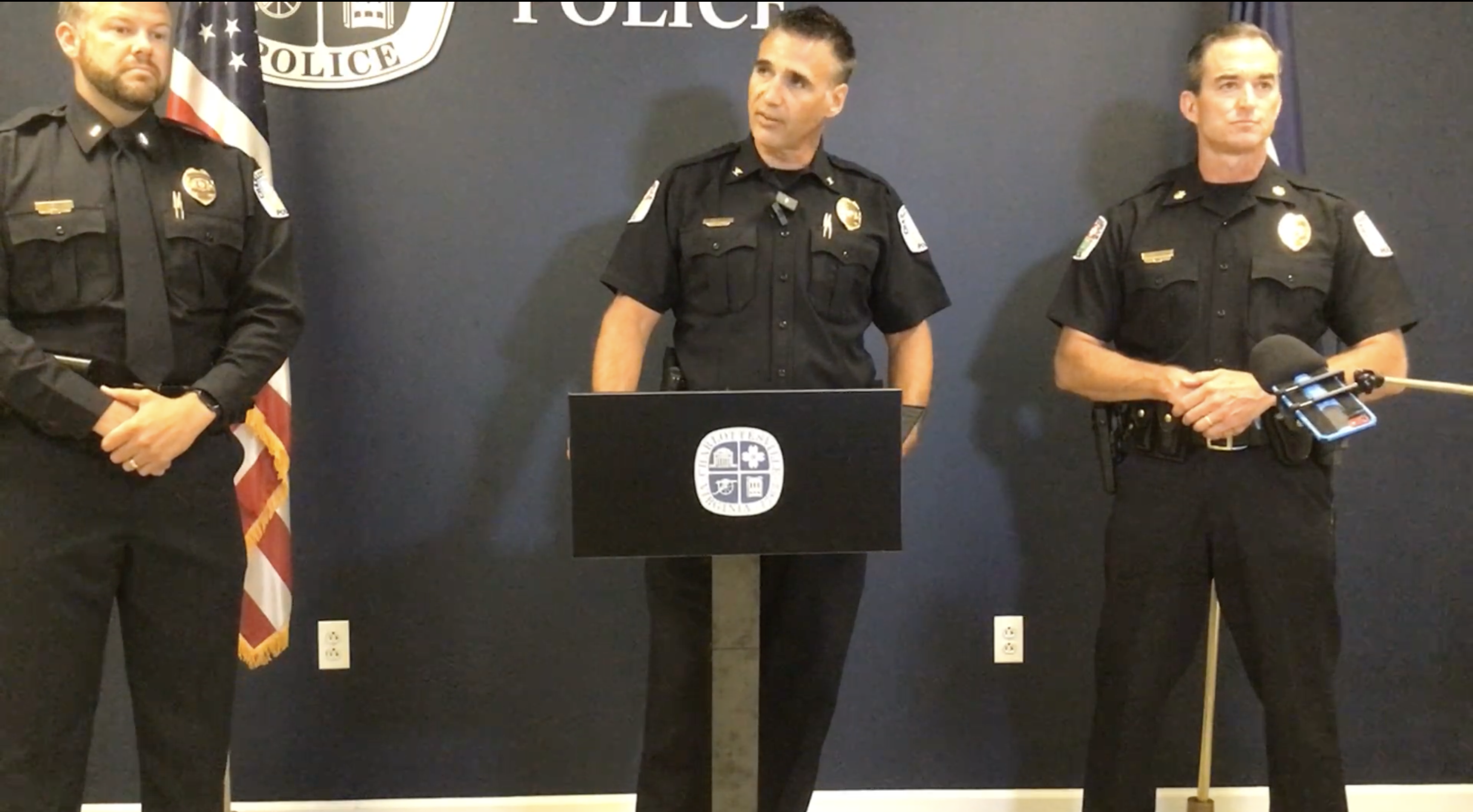Holly Hatcher stands in the middle of the living room of her new Belmont home. Surrounding her are moving boxes, picture frames temporarily placed on the fireplace mantel, and books randomly arranged in the built-in shelves of the 1920s-era house. Pop tunes from 106.1 The Corner are playing and her two beloved 90-pound canines, Lucas and Porter, stretch on the floor of the updated kitchen, looking jealously at her husband-to-be, Dave McDaniel. He is eating a slice of salami.
 |
Hatcher, and her fiancé, a software developer, had spent the previous weekend transferring their belongings from a former residence on Meade Avenue. Three weeks before walking down the aisle, Hatcher has managed to buy a place, move into said place, rent the old one, put final touches on her wedding plans and manage a demanding job as Director of Programs and Donor Engagement with the Charlottesville Area Community Foundation (CACF). Her friends and co-workers call her tireless, and after spending time with her, I’d say they’re right. The night she invited me to visit her in her new home, I could sense the undercurrent of excitement in her life. She also offered me a slice of salami.
There is little that Holly Hatcher does that is left to chance—a purposefulness of mind that she has manifested throughout her career forming networks among people and which has positioned her, at 35, as one of the city’s most energetic new leaders. On a personal scale, she chose a house in Belmont so that she could get involved in the neighborhood association. “Between my job and finding the love of my life and moving into a new home in Belmont, which we’re so excited to be part of the Belmont community, life is pretty good right now, and that’s pretty exciting to me,” she says.
As she continued to unpack, Hatcher called my attention to a thick binder on the kitchen counter. She thought I would find it amusing, she said. The first few pages of her scrapbook attest to Hatcher’s go-getter instinct, to her longtime dedication to civic engagement.
A handful of slightly faded index cards are neatly taped next to each other. On them is Hatcher’s sixth grade speech for vice-president. The budding politician told students that while she wouldn’t be able to promise half-days and parties, the one thing she could give them, without a shadow of a doubt, was her complete commitment. She would be “the best I can be.”
A newspaper article published three years later further expresses her unflinching drive for what’s right. The headline bears her name. In her freshman year in high school, Hatcher was one of only two girls on the school’s soccer team. That needed to change. “Every year they put it off, but one day it’s got to happen. I want to be here when it does…If I’m the one who has to carry the petition around, I’d do it,” she is quoted as saying.
“She is a doer, she follows through, she has ideas, she puts them into action, she is really good at networking,” says friend and onetime co-worker Becky Reid. In the end, “she has a heart for social justice, she has such amazing convictions for so many social justice issues.”
Even her dogs reflect her values. Lucas is an 8-year-old mutt rescued from Southwest Virginia by Animal Connections. Porter was adopted by McDaniel from the local SPCA.
A few days before the evening of unpacking, Hatcher sits with me outside Mudhouse on the Downtown Mall. She talks about her role at CACF, which allows her to marry some of her most pronounced traits: the ability to have a constantly growing network base and her devotion to the community. By reaching out to and managing donor relations, Hatcher has found the right balance.
“The job has exceeded my expectations, because every day I get to learn about all the wonderful things going on in Charlottesville and the surrounding counties and meet these incredibly passionate people,” she says. “The flip side to that is I also get to help donors who really care about philanthropy and making a difference.”
We consider what her work is akin to, and Hatcher comes up with an early-century telephone operator, plugging people in to each other, connecting them.
|
LOCAL NONPROFITS The number of registered local nonprofits (501 (c)) as of January 2010 in CACF’s service area: Albemarle County 424 Buckingham County 63 City of Charlottesville 720 Fluvanna County 82 Greene County 70 Nelson County 105 Orange County 222 Grand Total 1,686
Source: National Center for Charitable Statistics (NCCS) |
“That’s the closest analogy to my job that I can think of,” she says.
But she actually takes it one step further, linking people to money and money to social causes. Last year, she, with the help of other CACF staff members, started the Future Fund, a giving circle geared towards people in their 20s, 30s and 40s who might have little or no previous experience with philanthropy, or who believe that, given their modest means, philanthropy is not for them.
“Holly has tapped into a donor base that’s sort of nontraditional, people who may not have large Albemarle County estates, but still may have disposable income and are willing to and interested in seeing their dollars be used in a strategic way to make a positive difference,” says Dave Norris who has been a friend and colleague since Hatcher moved to town about a decade ago. The girl who pushed to change the face of soccer at her high school is now the woman who is altering the look and feel of local philanthropy to a more accessible experience.
“This idea that you would have to wait until you were more established to be able to be a philanthropist, I think is a misconception,” Hatcher says. “Giving on any level is giving, and it’s powerful and it makes a difference. And you can ask any nonprofit. They count on those small donations just as much as they count on those large investments, those large donations. And this is the power of philanthropy.”
Jake Zarnegar chaired the Grants Committee of the Future Fund last year. He sums it up this way: “This is not for big, fat cats of philanthropy. It’s more about democratic philanthropy.”
Funding the future
Back in April, Dianna Poe was not “thrilled” about having to speak in front of an audience. But she was ready to make a presentation that could change the odds of the small program in the city schools that is her baby. As she stepped up to address a gathering of Future Fund members, however, her anxiety was put to rest. “It was incredible,” she says. “I had never heard of a giving circle before and it’s all these wonderful young people.”
|
Dianna Poe, intervention specialist for the Charlottesville City Schools WALK program, felt intimidated standing in front of Future Fund members as one of the finalists for the fund’s $30,000 grant. “It was incredible,” she says. The WALK program, (it stands for Work Achieves Lasting Knowledge) was awarded the money, which Poe says, goes directly to tutoring and all the needs of the students who are in danger of not graduating from high school. “Our whole goal is that kids graduate high school. It takes a lot more than just doing your homework to graduate high school. You have to eat, you have to be engaged,” says Poe. |
Although she is reluctant, in what I come to realize is true Hatcher fashion, to take full credit for its creation, the Future Fund is alive and well in Charlottesville because of Holly Hatcher. It’s a giving circle that pools annual donations of $200 to $400, depending on a donor’s age. Through committee work and a final vote, donors decide where the money goes. One $200 donation suddenly grows into $28,000 or more.
Hatcher learned of future funds in 2007, at a conference for community foundations held in California. When she came back, she approached her boss, John Redick, president of CACF, “and with fellow staff and to his credit, he gave us the opportunity to give it a try.” She was relentless in getting the word out. Although not in her job description, she reached out to newspaper editors and to the Facebook nation to publicize informational events and sign up members. She put together a meet-and-greet gathering at The Local. (This year, the kick-off party was at The Jefferson).
In its inaugural year, 2009, the Future Fund counted 96 members and a pool of nearly $30,000, made up of membership money and other contributions. By vote, the theme for the first year was education. (This year, as of press time, 175 members signed up to be part of the Future Fund Year Two, for a total of more than $51,700).
“Last year would not have been a success without my coworker Jocelyn Scherr, and this year Sofia Case and Brennan Johnson will help make it all happen,” says Hatcher.
Twenty-four nonprofits applied to the membership’s Grants Committee for review. Finalists, including Poe’s WALK organization, were invited to give a presentation in front of the membership.
“These people were so engaged,” says Poe, who is an intervention specialist for the Charlottesville City Schools WALK program, (it stands for Work Achieves Lasting Knowledge), the nonprofit that was ultimately awarded the grant. “They asked questions that were so pertinent to our program and they had really done their homework. You could tell they were interested, you could tell they got what we were doing.
“The incredible part of it was not only did we get the grant, which would be great for our organization, but we had people come up and say ‘I want to volunteer in the classrooms, I want to be a mentor,’” says Poe.
The WALK program aids students who are in danger of not graduating from high school, providing them mentors and supplies, among other things. “We just fill the gap,” says Poe. “Our whole goal is that kids graduate from high school. It takes a lot more than just doing your homework to graduate from high school. You have to eat, you have to be engaged.”
|
HOW TO JOIN THE FUTURE FUND What: The Future Fund is a giving circle geared toward engaging young philanthropists, in their 20s, 30s and 40s, to support area nonprofits. When: Established in 2009 Membership fees: Age 20-29: $200/person; Age 30-39: $300/person; Age 40-49: $400/person Extended deadline to join: September 10 Who to contact: Sofia Case, Donor Relations and Programs Assistant, at 434-296-1024 or scase@cacfonline.org. |
Hatcher herself has been a kind of mentor—not to high school students, per se, but to newbie philanthropists. “Holly has been wonderful in teaching us new philanthropists how it works,” says Zarnegar. “She has been really our kind of mentor, liaison to the world of grant making and philanthropy, but at the same time, she’s really careful to be really hands off and non-directive. She wanted us to feel like we were driving the whole process.”
According to Hatcher’s friend Emily Wampler, who is also a fund member, the Future Fund serves another important role: to engage young professionals “intellectually and financially.” The fund, she says, is “bridging a major gap in our community in a philanthropic sense. What motivates these 20-, 30- and 40somethings to help is that they were concerned and aware of issues in their community, they didn’t necessarily have a way in which to learn more deeply about the issues, or have a hands-on, clear impact in affecting change. The Future Fund changed that for many people.”
And it’s no flash in the pan. “I think she has set something in motion here that’s going to be an impact for years,” Zarnegar says.
Hatcher agrees. “I think our community can only grow stronger the more people who get engaged, and the Future Fund is a great example of the immense talent that is in this town,” she says. “It only got me more excited about the potential of our community, our future. Our community is in really good hands now and I think we will be in good hands for decades to come.”
Not everyone recognizes a sea change in philanthropy, however. “I think at the end of the day, we have very, very competent people on our board who have been in philanthropy for all of their lives, people in their 60s and Future Fund members in their 20s, 30s, and 40s,” says John Redick, who, as president of CACF, is Hatcher’s boss. “They may dance to different music, but they all dance. They are all passionate people. They care about our community. They care about each other.”
CACF was created in 1967 and serves the people of Charlottesville and the counties of Albemarle, Greene, Louisa, Fluvanna, Orange, Nelson and Buckingham. It runs donor-managed funds, which is a fancy way of saying the foundation helps philanthropists figure out where to allocate their money and helps nonprofits figure out how to get in front of donors.
Times are tough nationwide for charitable giving. According to the Giving USA Foundation and the Center on Philanthropy at Indiana University, total contributions from individuals, foundations and corporations declined 3.6 percent to $303.75 billion in 2009 without factoring in a small price deflation.
CACF, however, recorded an impressive year. Amid uncertainty, “we were pleasantly surprised that our donors were generous with us and we, in turn, could be generous with our communities, because we gave away more money last year than in any of the 40 years of the foundation,” says Arthur Kiser, CACF’s current Chief Financial Officer. “One of the reasons we were able to do that is because we had our third best year in our history in terms of gifts from donors.”
In December 2009, CACF awarded $5.7 million in grants, an increase of 35 percent over the previous year.
Organizing on her mind
Creating the Future Fund, says Norris, is right in line with other endeavors Hatcher has pursued throughout her career as organizer (including a stint as Norris’ re-election campaign treasurer), networker and leader. “Her civic life has been encouraging civic engagement, encouraging young people and people who aren’t part of the establishment, if you will, the traditional establishment, to speak out and to get informed and to make this a better community,” he says.
|
Arthur Kiser, CACF’s CFO, was struck by Holly Hatcher’s dedication and commitment to a better community from the start. “I think Holly is a fighter and she fights for what she wants and what she sees,” he says. “She fights for people who are less fortunate.” After three and a half years, Kiser is still impressed. “Sometimes the wow factor goes away, but I continue to be amazed by her,” he says. |
“I know that our community/region has many problems. I am not a Pollyanna,” Hatcher writes me in an e-mail one night, before going to bed. She tells me that many of the issues that afflict our community, and our society more generally, keep her up at night. “That is precisely why the CACF, philanthropy and the nonprofit community are so integral to the community. I like to be a part of making positive change. I love being the ‘connector,’ ‘facilitator’ and helping people do good. I have found my professional ‘home’ at CACF and feel very fortunate that I’ve been able to expand my role.”
But how does she do it? How does she personally know all these people?
“I have always been in a position where I get to meet a lot of people,” says Hatcher, evidenced when I strolled along the Downtown Mall with her. Either people stopped to say hello or her hand would wave with every other step. “I enjoy walking down the Mall and running into people I know. I think that’s what kept me in Charlottesville. That’s the beauty of this town,” says Hatcher. “I love walking down the Mall and saying ‘Hi’ to Chief Longo. How cool is that. There is the Chief of Police and we know him!”
Yet, friends say when she needs to be, Hatcher can be all business.
“I think she is very driven and has very high standards personally and for her work,” says Jill Ashley, Future Fund member and friend. “There is a wisdom to Holly that’s beyond her years. She has an ability to be passionate, but not judgmental.”
Hatcher joined CACF in 2006 and even during her initial interview, she left a lasting impression. “Wow,” Kiser says recollecting the interview. “How can a person this young be so aware of this community? The community I lived in, and she’s acquired a lot of contacts and she knows what’s going on politically, socially.”
Kiser was most impressed with Hatcher’s depth, both of her Rolodex and of her uncanny commitment to the bettering the lives of residents of our area and surrounding counties. “I don’t know of quite anyone locally who is doing what she’s doing,” he says. “Sometimes the wow factor goes away, but I continue to be amazed by her,” says Kiser.
Redick saw potential, too. “I think I was personally attracted by the fact that she had a drive, a caring for nonprofits that certainly resonated with me. Not that the other candidates didn’t, but I think her passion for the nonprofits and the work that nonprofits do…made her stand out above many other very highly qualified candidates,” he says.
Through her many roles in Charlottesville in the past decade, Hatcher saw a lack of young adults involvement in many facets of the community. “Through that work and my own interest in local politics, I would go to Democratic Party functions in Charlottesville and see that there weren’t that many people that were my age,” she says. Hatcher co-founded Left of Center, a forum for young progressives, or, as the website puts it, Dem-curious. “We are affected more by local politics than we are by anything going on at the state or national level,” she says.
Another example of Hatcher’s involvement in social causes: At the tender age of 29 she was hired by Planned Parenthood to direct its organizing efforts in Virginia.
In July of this year, Hatcher was promoted to Director of Programs and Donor Engagement at CACF. She engages donors and educates them about philanthropy, something, it seems, she was born to do.
“She’s been here three and a half years and she’s now being promoted and being recognized for these contributions, and that’s all really exciting to me because not every decision you make sort of pans out,” says Kiser.
Much of Hatcher’s vision for her own professional life, however, did pan out.
“I am a big fan and seeing her move up the chain at the foundation is one of the best things that’s happened at the foundation in a long time,” says Dawn Heneberry, chair of CACF’s Governing Board.
Familiar instincts
So where does this drive come from? Her upbringing gives a hint.
Hatcher was born in 1975 on an army base in Fort Gordon, Georgia. “I was an army kid for the first five, six years of my life,” she says, although she, her father and sister didn’t travel much. “I have an appreciation for our service men and women, I think because of being surrounded by [the culture] and hearing my dad’s stories,” she says.
Her organizational skills may be rooted to that time. “[Our father] would tell us to clean our room and we’d have to stand for inspection like the military standing in the doorway at attention and he’d come and inspect our rooms,” says Hatcher with a smile.
“She is an excellent multi-tasker. I’ve always found that she can juggle a lot of tasks at the same time,” says Kiser.
But Hatcher’s calling solidified early in her academic career. In 1997, she graduated from Appalachian State University in North Carolina. When asked about her major, she laughed. “I just didn’t like the concept of this checklist. You need to check everything off the list to get a degree,” she says. So, following her instincts, Hatcher chose an interdisciplinary program where she designed her own course of study with a focus on race, class and gender issues.
While in college, she was the recipient of the ASU Ronny L. Brooks Outstanding Leadership Award and was very involved in the volunteer service organization on campus. And there was more. “I helped plan our first-ever alternative spring break,” she says with evident pride. That year, Hatcher and other organizers took 11 volunteers to Atlanta for a week with a group called “Hands on Atlanta,” an organization that helps people find volunteer opportunities.
“I think it was in college where the combination of my studies plus what was going on in the community and my volunteerism really started to formulate what I would go on to do,” says Hatcher.
Her success as an organizer has affected many residents in Charlottesville.
“There are a lot of people who are Holly’s age who spend their time on any variety of pursuits that are more about what they can do for themselves,” says Norris. “What Holly I think is trying to demonstrate with her life is that you can do for others and still get a lot of satisfaction, personal satisfaction out of it, still make a career out of it.”
What a career, indeed. It was right after earning a Master’s degree from the University of Richmond in 2001 (with a focus on Advocacy and Social Change, one that she also designed herself) that Hatcher made the one-hour journey to Charlottesville. She applied for a job as organizer and coordinator for the Public Housing Association of Residents (PHAR). Norris was one of the eight board members who interviewed her.
“She struck us as very sincere, someone with a lot of good energy and dedication to community empowerment, social justice,” says Norris. Hatcher advocated for public housing residents to City Council and the Charlottesville Redevelopment and Housing Authority, and managed operations for the association. In working at PHAR, Hatcher says she was introduced to a part of Charlottesville that most people never see. “It was an interesting way to be introduced to the community,” says Hatcher. “That will always stick with me.”
After her stint with Planned Parenthood, she worked as assistant director of programs for the UVA Center for Politics.
At CACF, Hatcher says she found her balance. “I love doing what I do,” says Hatcher. “It’s a cliché to say you want to make a difference, but I remember being in college and trying to figure that out and I think where I am now is the place where I am meant to be because I wake up every morning and I enjoy connecting people and helping facilitate change and seeing good things happen.”
For Cristine Nardi, executive director of the Center for Nonprofit Excellence (CNE), there’s a key trait in Hatcher’s dynamic personality: “She is not afraid to tell the truth and she doesn’t just tell the truth, but she also looks for ways for organizations and for individuals within those organizations to get the resources they need to do their jobs as effectively as possible,” she says.
Nardi, herself a Future Fund member, has collaborated with Hatcher and CACF. In addition, Hatcher was accepted in the inaugural class at the CNE’s Board Development Academy, a nine-month course on how to become an effective board member. Hatcher made her presence known with engaging and searching questions. “In doing that, and in insisting on having a dialogue about what the issues were at the academy, I think she raised the level of discourse at the academy for everyone else who was there,” says Nardi.
Coming home
That Hatcher is dedicated to her job is a fact, but she also knows how to have some fun.
On a Thursday night at her friend Heather’s house, she looks at her cards and shrugs. It hasn’t been a good night for poker. She says she has a lot on her mind. She folds and looks so disappointed that one of the seven other women jokes about Hatcher’s competitive nature. “I am not competitive,” she says defensively. The room fills up with laughter. “Really? Am I competitive?” The monthly, women-only poker game has been running for almost a year. It’s a chance for Hatcher to catch up with good friends, drink a little wine and steal a few laughs, obviously.
Although Hatcher knows many, many people in Charlottesville, she is far from being a social maven. She is a private person who knows how to balance her busy work schedule with a busy social and home life.
“I think she likes nothing better than curling up with her dog and her fiancé and laying low,” says Norris. “She is not partying on the town all the time, even though she seems like she knows everyone in Charlottesville.”
Wampler agrees. “Holly is a social butterfly but in a different way. In the way that once she is your friend, she is going to stick by you and support you in a very sincere way, almost like a family member,” she says, and adds that what makes Hatcher a successful professional is her honesty. “This mixed with her work ethic and persistence to make Charlottesville the best and most fair place for everyone to live, makes her somewhat of a rock star, for lack of a better word.”






